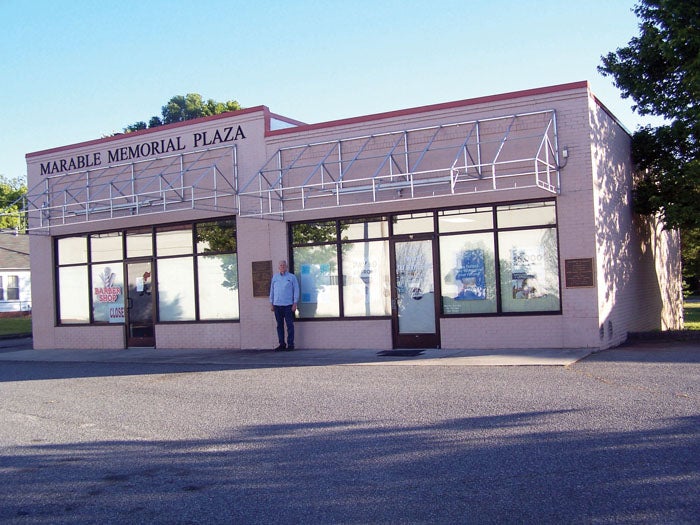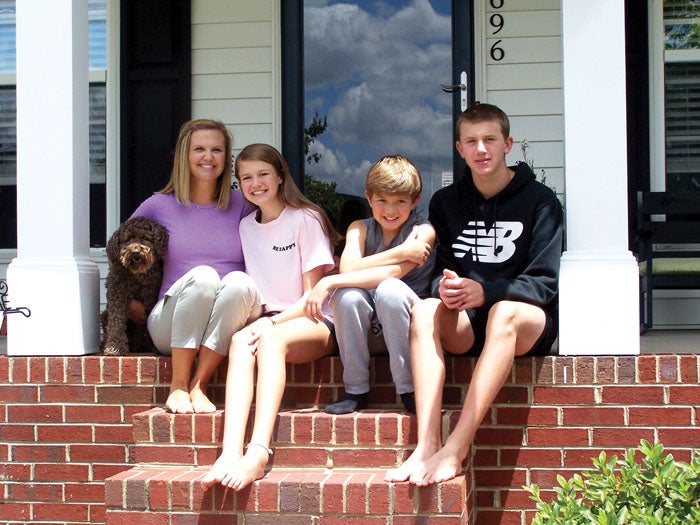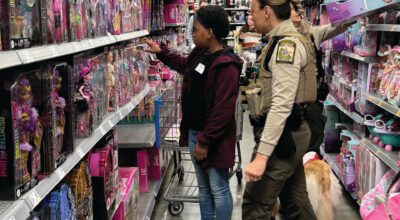From 1929 to pandemic, grocery delivery comes full circle
Published 12:05 am Thursday, June 11, 2020

- Philip Castor in front of old grocery building
By Ann Wayne
For the Salisbury Post
The year was 1929. Brothers-in-law Grady Ross and Ross Castor opened a grocery store called Ross and Castor Grocery in the Centerview Community of Kannapolis. They offered the community fresh meat, produce and delivery service right to their back door. There were no phones in most homes and no online orders.
Life was simple.
This wasn’t the first grocery store in the family. Ross Castor’s dad, C.H. Castor, had opened a grocery store on the other side of the same building many years before, but he offered more than just groceries. His customers could buy animal feed, too.
At Ross and Castor Grocery, customers could set up credit, but not the plastic card that we know today. The grocer kept a tab and the customer paid off their debt on payday according to Philip Castor, the only living son of Ross Castor. He grew up working at the grocery store.
“Some families would come by on a Saturday evening with a sob story, but they were never turned down by Dad or Uncle Grady,” Phillip said.
Many times, the tabs were not paid back, Philip said.
Ross and Castor Grocery would close a half day on Tuesday, as was customary in the Kannapolis area for many years. They were closed on Sundays to go to church and spend time with family.
Graydene Kidd, the daughter and only living child of Grady Ross, said, she would ride around to customers’ homes early in the morning before school with her dad to take orders. Then, she would walk to Aycock School after they finished their rounds, but she never worked in the grocery store. Most families owned one car and a lot of women were homemakers and did not drive.
Grocery delivery to homes was a way of life in small towns. Philip and Graydene both remember the phone number: 45L. Philip said, “The operator would pick up the phone and say, ‘number please.’ ” Even Philip’s family did not have a phone in their home.
Philip remembers sorting glass soda bottles in wood crates for the vendors to pick up and recycle when he was only eight. When he was 16 years old, he drove the delivery truck after school. He even helped grind hamburger and would go to customers’ homes and sit down at their kitchen table to take their grocery order.
Ross and Castor’s store had several pickup trucks through the years. A Chevrolet pickup was one of the earlier trucks, but later they purchased a 1949 Dodge with a red cab and a black bed. They would cover the back with a tarp when there was inclement weather.
There were other drivers, too. Philip and Graydene recalled a Mr. Tucker and a man named Dunk Eddleman. Bigger Brothers of Charlotte supplied their meats and the Critcher Brothers from Boone delivered cabbage grown in the mountains.
One of the sons of Ross Castor, David, married a Critcher girl, Faye. Grady Ross’s wife, Hama, had met Faye while she was in the hospital in Charlotte and told David that he needed to ask her out on a date. The rest is history. David and Faye were married over 50 years until his death in 2008.
Another local vendor, Deluxe Ice Cream in Mooresville, supplied the ice cream to the store and is still in business.
Neighborhoods were segregated, but Ross and Castor Grocery delivered to other communities, too.
Ross and Castor Grocery closed in 1963 as the big box stores began opening, as it was difficult to compete with them. The building where Ross and Castor Grocery still stands today, at 505 Front St., and is home to a tax business and a barber shop.
Now, many families are choosing grocery delivery and have found the service to be helpful during the ongoing COVID-19 pandemic.
Amy and Shawn Powell, of Concord, are one of those families. They have three children, Gavin, 15; Ella, 12; and Parker, 10. Amy began ordering groceries online a year ago and said she recently made the move to online ordering while sitting at a baseball game and thinking about all the things on her to do list.
“I have not turned back,” she said.
She says grocery shopping online has saved her time in not having to drive to the store and at least 45 minutes to one hour picking out products several times a week.
“I’m saving money too. I’m not tempted to pick out random things like I would walking down the aisles of a store and I’m saving gas by not driving to the store,” she said.
She can choose the time for delivery and spend the time that she would have been shopping in a store with her family instead.
Amy uses a service called Instacart and orders from Food Lion. She always adds notes for the shopper (she prefers green bananas, for example). The store meets her expectations most of the time.
“Another benefit is that we get to know the delivery people because many times, they are the same ones,” she said. “We form relationships with them.”
She met one family where a parent and teen were working together so that the teen could earn money.
Another family who is using home delivery for groceries is Mary Ann Martinez. Recently, she’s been working at home in Concord most days during the pandemic. But she has ordered groceries online for over two years.
Both of her girls are in competitive cheer and they travel three weekends out of the month. She adds her items to the cart throughout the week and chooses her delivery time.
“I save about $100 a month because there are no impulsive purchases and I save time by not driving to the store,” Martinez said.
One delivery guy left her a sticky note, “Have a great day Maryann!”
She uses Walmart most of the time, but has tried Harris Teeter, Target, Instacart and Food Lion. Walmart is much easier to navigate, she said, and they substitute out a name brand item if they are out of their brand. Sometimes, they offer a larger quantity at the same price. She chose the $12.99 per month subscription for delivery which offers unlimited delivery no matter how many times she orders.
“Some items have been more difficult to find during the COVID-19 crisis,” she said.
Items such as toilet tissue and paper towels have been limited to one or two packs. She learned to make smaller orders at times during the pandemic if she saw that it was in stock to make sure she received what her family needed.
Among the many delivery services offered now are Amazon, Instacart, Shipt, Postmate, Peapod and the list goes on. These services are available depending on where you live. Rural areas are more limited. There is usually a $25-$35 minimum order. Instacart offers free delivery with a minimum order of $35. Most drivers wear a mask when they deliver, especially during the COVID-19 crisis.
A local driver, Lee Ziegler, drove for Lyft and Uber before the pandemic. He is also the worship pastor at the Well Christian Church in Concord. The need to transport people slowed down a lot during the crisis so he looked for another source of income. He has been driving for Instacart and Shipt and will consider continuing the service.
“I have learned how important communication is with the customer,” Ziegler said. “Some stores may not have all the products on their list, so you have to contact them about other options.”
The customer can chat with the shopper. Ziegler shops and delivers. He said the grocery list is usually grouped by categories, making it easier to find the products. Target even lists the aisle number.
There is a formula for how much a delivery person should make on each delivery. The distance to drive to the store and how long it takes to shop must be considered. A tip is usually figured in by percentage. Instacart suggests a tip amount, but the customer can change the amount. Shipt offers the customer the option of a tip.
Though Ziegler works for Instacart and Shipt, he prefers the latter because of the way their orders are sent. Shoppers can line up orders during the hours they are available with the option of accepting or declining. With Instacart, you can’t plan ahead. You must accept a delivery on the spot.
Publix and Target offer both Instacart and Shipt. Target offers prepaid service and allows the shopper/delivery person to check out at customer service, so they do not have to wait in a long line.
Ziegler shared one story of having a unique customer who was a cancer patient in Salisbury. Her daughter lived in New Jersey and had shopped for her online at Publix in Concord. Ziegler had the opportunity to deliver her the groceries.
“People are sometimes struggling, especially during the pandemic. We just need to be friendly and patient and offer a little grace to each other,” Ziegler said.
Grocery delivery really has come full circle. Almost 100 years ago, the same service that was offered at Ross and Castor Grocery is here again.




